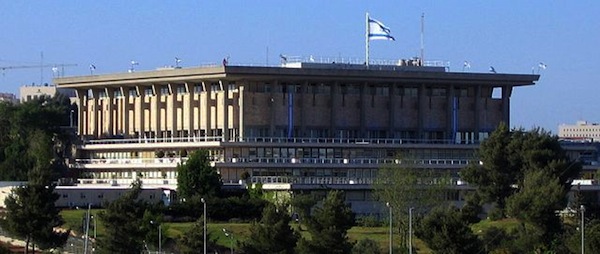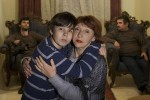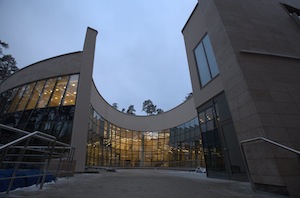(Beny Shlevich photo)
הצעת חוק החדשה של חברת הכנסת תהילה פרידמן ממפלגת כחול לבן, מעוררת עניין רב בעולם היהודי. לדברי אחד מהבכירים בקהילת היהודים בארצות הברית, דיוויד באטלר, הצעת חוק זו מעלה על הפרק את אחד האירועים המשמעותיים ביחסי ישראל והתפוצות מזה שנים רבות.
השאלה שהחוזרת על עצמה אין סוף פעמים, נדונה לעיתים קרובות במאמרי דעות בעיתונות, בנאומים ובכנסים יהודיים שונים, אך היא מעולם לא זכתה לתשובה חד משמעית. כעת מוצעת בכנסת חקיקה חדשה שתיתן למנהיגי יהדות התפוצות סוף סוף תפקיד רשמי בענייניה של ישראל, ואולי אף תבשר על עידן חדש ביחסי ישראל והתפוצות.
מתוך כלל היהודים בעולם שמספרם מוערך בכחמישה עשר מיליון, קרוב לשבעה מיליון גרים בישראל, לפי נתוני ממשלת ישראל. על פי הערכות שונות כשמונת המיליונים הנותרים חיים ברובם בשש המדינות הבאות: ארה”ב כשישה מיליון, צרפת כחצי מיליון, קנדה כארבע מאות אלף, בריטניה כשלוש מאות אלף, ארגנטינה כמאתיים אלף ורוסיה כמאתיים אלף.
את הצעת החוק, שזכתה לתמיכת משרד התפוצות, מקדמת כאמור ח”כ תהילה פרידמן. החוק המוצע יחייב את ממשלת ישראל להיוועץ במנהיגי יהדות העולם בעניינים שייחשבו בעיניה כמכריעים, ונוגעים גם לכשמונה מיליון היהודים שחיים מחוץ לישראל.
באטלר אומר הצעת החוק החדשה “עשויה להיות אחד האירועים המשמעותיים ביותר ביחסי ישראל והתפוצות מזה עשרות שנים”. באטלר אגב משמש יו”ר ועדת ישראל וחו”ל של ארגון הגג של הפדרציות היהודיות בצפון אמריקה (שמאגד מאה ארבעים ושש פדרציות יהודיות ועוד שלוש מאות קהילות עצמאיות).
פדרציות אלו שולחות במשותף לישראל מדי שנה מאות מיליוני דולרים בדמות מענקים למלכ”רים שונים, שפועלים למען ישראלים מכל מגזרי בחברה. ביניהם שני השותפים העיקריים של הפדרציות מחוץ לארה”ב: הסוכנות היהדות לישראל וארגון הג’וינט.
בסוף חודש אוקטובר קיימו הארגונים את הכנס השנתי שלהם (בפורמט מקוון) ובו עלתה לדיון השאלה המרכזית: באיזו מידה צריכה להיות ליהודי העולם אמירה בענייני הפנים של ישראל. שאלה זו שימשה כזרז להצעת החוק הממשלתית של השרה לענייני התפוצות עומר ינקליבץ’ (השרה החרדית הראשונה בישראל).
אריק פינגהרט, לשעבר חבר קונגרס יהודי מאוהיו (עומד כיום בראש רשת הפדרציות היהודיות) מאמין שהישראלים וממשלת ישראל צריכים לרצות לשמוע גם מהיהודים בעולם, וללמוד ולהבין את נקודות המבט של היהודים בעולם. “איננו רוצים לנסות לומר לממשלת ישראל מה לעשות, אבל אנחנו כן רוצים שהם ישמעו את מה שיש לנו לומר בעניינים המשפיעים על הקהילה שלנו”, הוא מוסיף.
לדברי השרה ינלקביץ’: “עלינו להבין לעומק את האינטרסים והצרכים של כשמונה מיליון האחים והאחיות של ישראל הגרים מחוץ לגבולותינו. זה נכון במיוחד כאשר מדינת ישראל מקבלת החלטות המשפיעות ישירות על קהילות יהודיות מחוץ לישראל. אם למדתי משהו בתפקידי כשרה בשמונת החודשים האחרונים, זה שליהדות העולם יש קול. הוא עשיר, הוא מגוון, הוא חזק, אי אפשר ואין רשות להתעלם ממנו”.
ישנן כמה סוגיות שבאופן קבוע נוגעות בנקודות רגישות במערכת היחסים המורכבת בין שתי הקהילות היהודיות הגדולות בעולם, ישראל וארה”ב. רוב היהודים האמריקנים מזדהים כרפורמים או כקונסרבטיבים, אך היחס לשני הזרמים הלא אורתודוקסיים הללו הוא יחס של בוז או עוינות של ממש, מצד רבים בישראל, בכלל זה הרבנות הראשית. גיורים שעורכים רבנים רפורמים או קונסרבטיבים אינם מוכרים בישראל, ויהודים אמריקנים שרוצים להתפלל בכותל המערבי במניינים שיוויוניים, בעירוב נשים וגברים או בהובלת נשים, נחסמים באופן קבוע ואינם מורשים לעשות זאת.
“במשך זמן רב מדי הייתה ישראל המקום היחיד עלי אדמות שבו לא כל היהודים מקבלים יחס שווה. זה משהו שישראל צריכה לתקן ויפה שעה אחת קודם, ולא רק בגלל יהודי התפוצות”, אומרת חברת הכנסת מרב מיכאלי ממפלגת העבודה. “יש לנו גם כאן בישראל יהודים רפורמים וקונסרבטיבים שעדיין אינם נהנים משיוויון לא במימון, לא בזכויות ולא בהכרה על-ידי המדינה”, היא מוסיפה.
רבים מחברי הכנסת התומכים בחקיקה החדשה התנסו במגורים בתפוצות או בעבודה עם יהודי התפוצות. מיכאלי עבדה בעבר כמדריכה במרכז קהילתי יהודי במערב פאלם ביץ’, פלורידה. פרידמן, עורכת דין דתייה מירושלים, ייצגה בעבר את הפדרציה היהודית הגדולה ביותר בניו ג’רזי (הידועה בשם גרֵייטר מֶטרוֹ-ווֶסט). הוריה של ינקלביץ’ עלו לישראל מברית המועצות לשעבר.
חברת כנסת נוספת שתומכת בחקיקה היא מיכל קוֹטלר-ווּנש ממפלגת כחול לבן, שגדלה במונטריאול ולאחר מכן שבה לישראל. אביה, ארווין קוטלר, שימש בעבר שר המשפטים בקנדה. לדבריה: “השאלה אינה אם אלא איך לערב את יהודי התפוצות. אנחנו חיים ברגע היסטורי, שבו יש לנו הזדמנות כבירה לעצב מחדש ולשנות את תבנית המחשבה ביחסי ישראל והתפוצות, למה שהיא שהייתה אמורה להיות”.
שמואל רוזנר, שמשמש עיתונאי ופרשן של הניו יורק טיימס, אומר כי הוא אינו חושב שהצעד הזה יעבור בכנסת במיוחד עכשיו, כשישראל ממוקדת בקורונה, ודעת ראש הממשלה בנימין נתניהו מוסחת בשל ההפגנות נגד עמידתו בראשות הממשלה. הוא מוסיף: “הקמת מנגנון אפקטיבי שמייצג נאמנה את האינטרסים של יהודי התפוצות יהיה בלתי אפשרי, והישראלים אינם רוצים בחוק שכזה. אני חושב שהתייעצות בין ישראל לבין יהדות העולם צריכה להיעשות באופן קבוע ורציני, אבל לא צריכה להיות רשמית בשום צורה. אני תומך לחלוטין בדיאלוג, אבל מתנגד לכל דיאלוג שתלוי במנגנונים רשמיים ובחוקים שתכליתם היא לכפות על ממשלת ישראל התייעצות עם גורמים מבחוץ”.
פרידמן מסכימה כי נמוכים הסיכויים שהצעת החוק שלה שפרטיה מעורפלים בשלב זה, לדרוש חובת התייעצות עם יהדות התפוצות בהחלטות שיש להן השפעות ישירות על יהדות העולם – תהפוך לחוק. זאת, במיוחד בנסיבות הנוכחיות. אך היא שואבת עידוד מכך שמשרד התפוצות הטיל את כובד משקלו על ההצעה. “זה פשוט הופך את כל העניין להרבה יותר רציני”, היא הוסיפה.
שירה רודרמן, מנכ”לית קרן משפחת רדומן, גוף פילנתרופי עם משרדים בישראל ובבוסטון, שמבקש לעזור לגשר על הפער שבין ישראל לתפוצות, אומרת שבדרך כלל המחוקקים הישראלים שמים לב לקהילות היהודיות מעבר לים, רק כאשר יש משבר בבית או בחו”ל. רודמן: “זה צריך להשתנות. במשך השנים, שמענו הרבה הערות נגד יהודים רפורמים וקונסרבטיבים, שהדעות שלהם אינן חשובות, למעט כאשר הדברים אמורים בתרומות ובשתדלנות למען ישראל. לפני למעלה משבעים שנה, הייתה לעם היהודי בכל מקום שבו היה – מטרה משותפת: להקים מולדת יהודית. היום, אין לנו מטרה משותפת או ייעוד משותף. איך אפשר לבנות עתיד ביחד אם אין לך מטרה משותפת”.
פרידמן שממשיכה בקידום החקיקה, אישרה שקיימת התנגדות להצעת החוק, אבל היא מאמינה שבכל זאת מדובר ברעיון חשוב. פרידמן: “אני מקבלת לחץ נגדי הן מהשמאל והן מהימין. ברור לכולנו שישנן סוגיות שרק אזרחי ישראל יכולים להחליט בהן, כמו ביטחון וכלכלה. אבל כשמדובר בסוגיות שיש להן השפעה ישירה על העם היהודי כולו, כמו שינוי חוק השבות או איך אמור להיראות הכותל, או שאלות לגבי גיור – גם יהדות העולם צריכה לקבל קול”.




